The Devil's Honey (1986)
Directed by: Lucio Fulci
Written by: Jaime Jesús Balcázar, Lucio Fulci, Ludovica Marineo, Vincenzo Salviani
Starring: Blanca Marsillach, Brett Halsey, Corinne Cléry, Stefano Madia
AKA Il MIELE DEL DIAVOLO
ITALY
AVAILABLE ON BLU-RAY AND DVD
RUNNING TIME: 96 mins/86 mins
REVIEWED BY: Dr Lenera
Johnny and Jessica are in the midst of a passionate relationship largely defined by Johnny’s continual lusting for sex. Dr. Wendell Simpson has little interest in his wife Carol and prefers to visit prostitutes. When Johnny injures himself in a motorbike accident, Wendell is the one charged with operating on him, but, due to Carol demanding a divorce not long before, he’s distracted and Johnny dies on the operating table. Jessica, blaming Wendell for her lover’s death, plagues him with phone calls, then kidnaps him and subjects him to humiliations….
And so, after the first of his three westerns, we come in this series of reviews to Lucio Fulci’s entry in sexploitation. One shouldn’t really be surprised that he made The Devil’s Honey; he dabbled in several genres early on in his career and, after the Italian horror boom of which he was a major part died down, he found himself doing the same around the mid-’80s until he returned to the genre with his highly disappointing final wave of films where his health clearly affected the quality of his output. Some of his gialli like A Lizard In A Woman’s Skin and New York Ripper [two words; toe sex] contained some sexual themes and content, while he even made a comedy called The Eroticist, which I haven’t seen yet but which seems to be largely about – bottom pinching. While this particular effort seems to be one of the better regarded of Fulci’s later pictures, I expected it to be little more than sleazy, empty fun in the manner of Joe D’Amato’s work of the period, and was prepared to just try to judge it on how well it worked as a soft porn movie. Indeed, it does start off in a manner that causes one to think that Fulci was just having fun and even sending up a genre he perhaps had little personal interest in. However, as it progresses, a deeper and interesting movie materialises, a surprisingly intelligent look at control, love and memory, and a well made one too, with very little of the carelessness that would soon go on to sadly characterise the output of this director. The down side of this of course is that the film is increasingly less prurient and may well have disappointed the raincoat crowd when it first came out, but I was really pleasantly surprised to find myself rather engrossed in a compelling drama which certainly did not come across as something that was put together and churned out just for money.
Fulci caught hepatitis during the filming of Conquest, and after just about managing to make Murderrock and Rome: Fighter Centurions he had to take a year’s break. He wrote a script called Collector’s Item that wasn’t that different from The Devil’s Honey with Bianca Marsillach in a similar role, but was still not well enough to direct it. Giuseppe Patroni Griffi took over, though Fulci disliked the result. Now there are rumours that Fulci planned a sequel to The Beyond called Secrets Of The Beyond which somehow metamorphised into The Devil’s Honey, though producer Vicenzo Salviani says that the first script, which was set mostly in the hospital, was brought to him by somehow else [probably Ludovica Marineo] and that he significantly altered it before offering it to Fulci whom he wasn’t sure would be well enough to direct. Fulci and Jaime Jesús Balcázar are also credited with the writing, though I think that 9 1/2 Weeks must have been an influence to some degree. The Italian/Spanish co-production was shot partly in Barcelona, Venice and a studio in Rome, and the two male stars Brett Halsey and Stefano Madia never even met. Marsillach wasn’t popular during filming; Halsey described her as having “no discipline and no talent”, while Salviana was so annoyed by her prima donna behaviour that, when he took her to the airport in Rome after filming ended, he actually punched her in the mouth. When she called the police, he said, “I was waiting for days to do that”. Fulci also disliked Marsillach for reasons that aren’t clear, though of course he was notorious for bullying his female stars. Though he seemed to have high hopes for the film which did moderate box office in Italy, it went straight to video internationally and never had a release in the UK until very recently on Blu-ray. The US video version Dangerous Obsession cut ten minutes and most of the extreme content, while the Japanese release had all of its considerable full frontal nudity optically fogged.
The film opens on Johnny [I’ll call the characters by their English language names] playing the saxophone in a recording studio underneath the opening titles. His girlfriend Jessica likes his playing so much that she’s turned on and runs into the booth to lick the spit off his lips rather than let him wipe it himself. Johnny responds by fondling her in front of the engineers and his band, kicking everyone else out and beginning to takes her right in the middle of the studio, against her protests, telling her that he’s her master and that everything he loves is in her. She argues that he doesn’t want her, only a piece of her, so Johnny responds by – playing his saxophone directly into her vagina. it’s one of the funniest scenes I’ve seen in ages and goes on for a long time too, far more than most American filmmakers would have dared. Meanwhile our doctor has just performed a successful surgery and calls to tell Carol, his wife, that he’ll be late. He visits Anna, a prostitute, but doesn’t seem to be interested in sex until – and I’m not making this up – she tries to fix a run in her stockings with, of all things, red nail polish, much of which ends up all over her naughty area. Wendell likes this very much so he rubs some of the polish all over Anna’s face before taking her violently and quickly, then paying her to leave. It’s almost as if Fulci couldn’t stage any of his extreme gore scenes, so he decided to show us two of the most daft sex sequences he could think of. However, one can’t but think of things like the way that both men seem to treat their women like pieces of meat and don’t appear to be of the tender sort. Very similar lines of dialogue such as, “surely you know me, I’m your master” and “you’re docile, you need a master” link the two even more. Johnny seems downright unpleasant the way he is with Jessica sometimes, even taking her from behind totally against her wishes while her dog howls at the door wanting to be let in – an alsation which by the way might very well be the same one that was in The Beyond.
Johnny is also something of a daredevil, getting Jessica to fondle him on the back of a motorbike. We don’t believe him when he says to Jessica that he loves her, but we do believe Wendell when he says the same to Carol – she just doesn’t do it sexually for him any more. After cocking up the operation on Johnny, he and her give it a final go, but a telephone call causes him to lose interest in the bedroom. Corinne Clery, probably most best seen as the poor lady ripped apart by dobermans in Moonraker, gets a touching moment here when Carol resorts to tearful solo pleasure, though of course those familiar with her turn in The Story Of O won’t be surprised. In any case, she soon disappears from the film, leaving Blanca Marsillach [the sister of Opera’s Christine Marsillach to take over as Jessica. It’s odd seeing her weep while watching a home video of Johnny forcing her to have sex on camera, her misery clearly being far more because she misses him and he’s now dead rather than his controlling, abusive nature which clearly turned a part of her on. The grief-stricken, indeed rather unbalanced, woman stalks, then drugs and kidnaps Wendell, who wakes up chained to a wall in the house Jessica shared with Johnny. Jessica proceeds to torment and torture him, but is there the possibility that Wendell is starting to enjoy this? It must be said that, apart from some hot candle wax and a very extreme moment involving a wooden beam, blood, her vagina and his face, there’s little of the extreme content that one might expect, but I was so involved that I didn’t mind. However, a happy-ish ending seems both truncated and out of place in this story, especially for someone of Fulci’s downbeat, even nihilistic, world view. Maybe it was demanded that he conclude things in this manner when it was seen that Fulci was crafted a rather artistic piece.
Some attempt is made to get inside the head of Wendell who clearly needs a ‘full’ sexual awakening, but the central character is really Jessica who somehow remains rather sympathetic. When she has Wendell in her power, she’s not just taking revenge on the person who basically killed Johnny, but is transferring much of the nature of her and Johnny’s relationship onto her and Wendell, with her now the one in charge. A surprisingly moving element of melancholy is introduced when Jessica and us have flashbacks which show Johnny in an even worse light. Jessica needs to delve into the past to confront the reality behind her rose tinted memories of Johnny so she can free herself of her obsession, and Fulci shows these moments with great care and economy, notably when Jessica walks towards the stairs in her darkened house and the lights come on as she goes up the stairs and sees Johnny coming down them. In fact he seems pretty energised as a director throughout much of this film, aided by the cinematography of Alejandro Ulloa, with a camera that slowly zooms in on faces [was this the last film to showcase this Fulci trait?], follows characters as they leave rooms then picks up on others as they enter, and tracks around rooms. There’s not much vivid colour, but it stands out when it’s used, like when Jessica takes a walk in the pouring rain, totally oblivious to all the wet. A constantly topless or totally naked Marsillach is quite restrained given the nature of her role, but still projects much of her character’s torment. Brett Halsey as Wendell doesn’t do quite so well, but I’m told by the female friend I watched this film with that Stefano Madia as Johnny has the erotic charisma to keep a woman like Jessica enthralled despite his nastiness. Claudio Natili’s music score has a saxophone-led main theme played so often throughout in various guises that you’ll be sick of it come the end credits, but there’s enough variety elsewhere, from euro-pop instrumentals to a moody theme that bares a striking resemblence to one Bill Wyman wrote the following year for Opera.
I’d imagine that, if the film were made today, the fact that Jessica is in love with this abusive, dominant character and doesn’t seen much bothered about his need for sex all the time and willingness to get it whether she does or not, would send some PC types crazy. After all, some even objected to Fifty Shades Of Gray’s dominant/submissive relationship, even if it was made clear early on that its heroine consented to everything, and even if Fifty Shades Of Gray is not good enough a film worth objecting too. The fact remains that some women do willingly stay in the sort of relationship that Jessica is in, as hard as it undoubtedly is for many to accept. And the one here has to be shown to be cruel for much of the rest of the film to work. Despite its first ten minutes or so, those after sexy thrills will probably be let down by The Devil’s Honey [the title refers to a poem in the film which is the only real time it could be called sexist] despite the continual boobs on show. And there are a few story niggles, most notably the revelation of the significance of a bracelet that Jessica wears, bought with Johnny off a street vendor in Venice played by Fulci himself where the man looks happy on screen for once. “The first to stop loving has to throw it away”, he tells her – but it would have been much better if we’d seen this scene near the beginning of the film rather than near the end, as it would have made the conclusion to this subplot more powerful and meaningful. Despite this, The Devil’s Honey has a commitment to it that really surprised me. Aided by the surprisingly perceptive script for which he obviously wasn’t totally responsible for but which he clearly had much input, Fulci projects some genuine feeling into this film which tries very hard to rise above its genre and ends up being rather haunting. I think it’s a major later work by him, in fact a major work by him full stop.
Rating: 










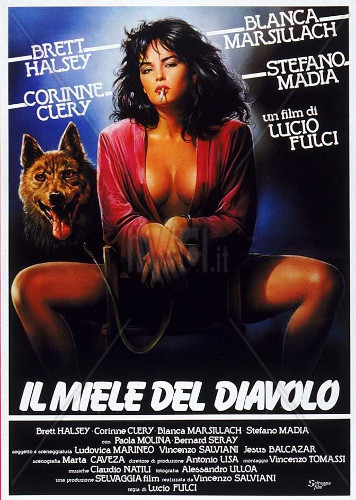
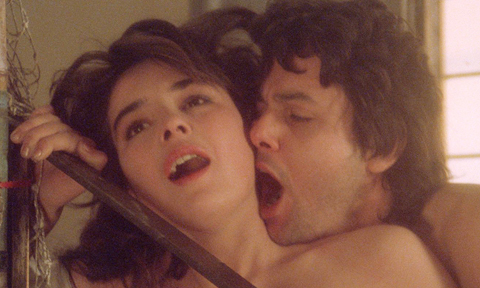
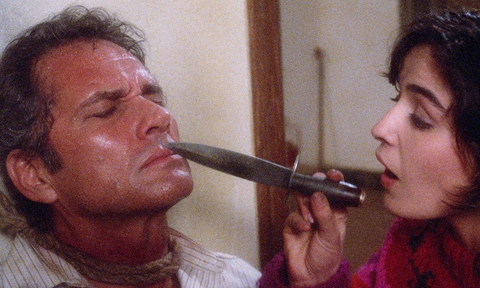

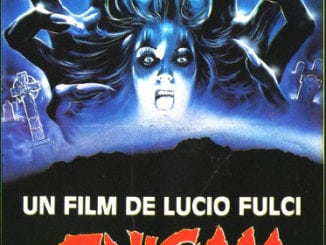
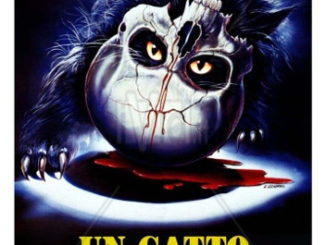

Be the first to comment